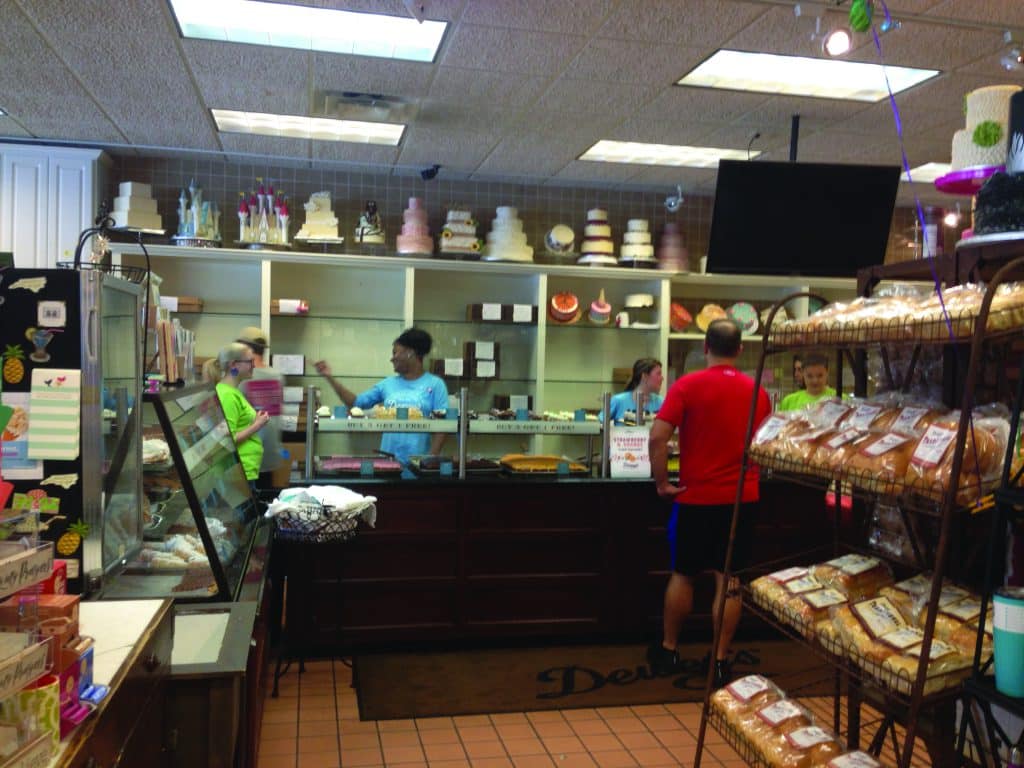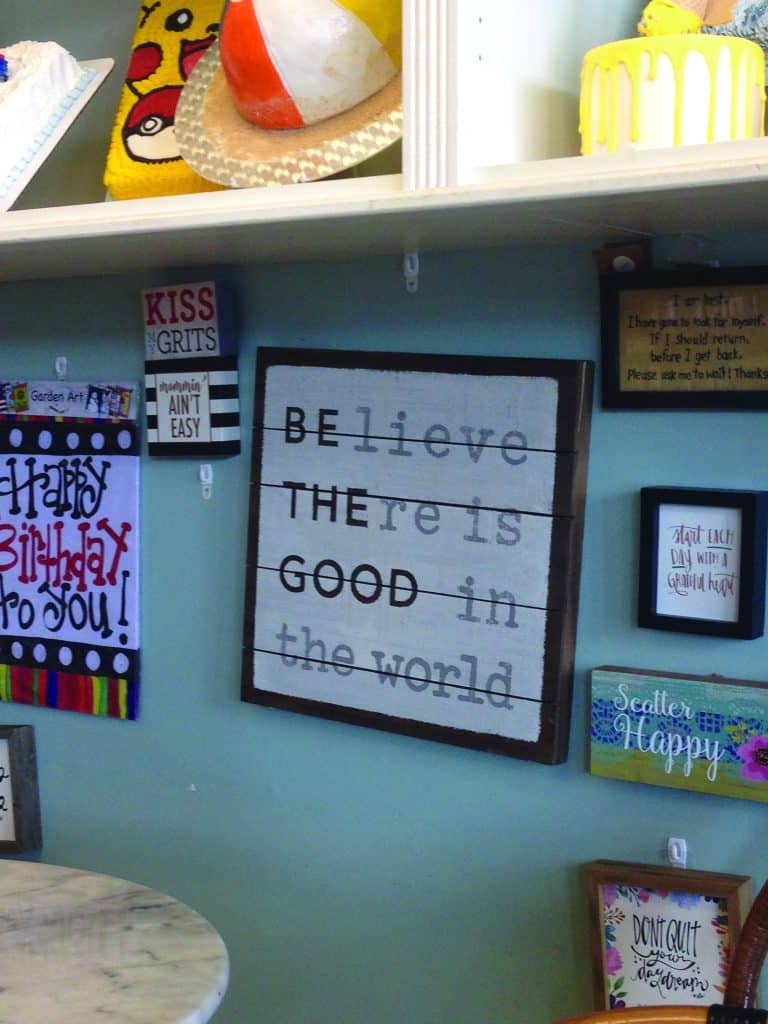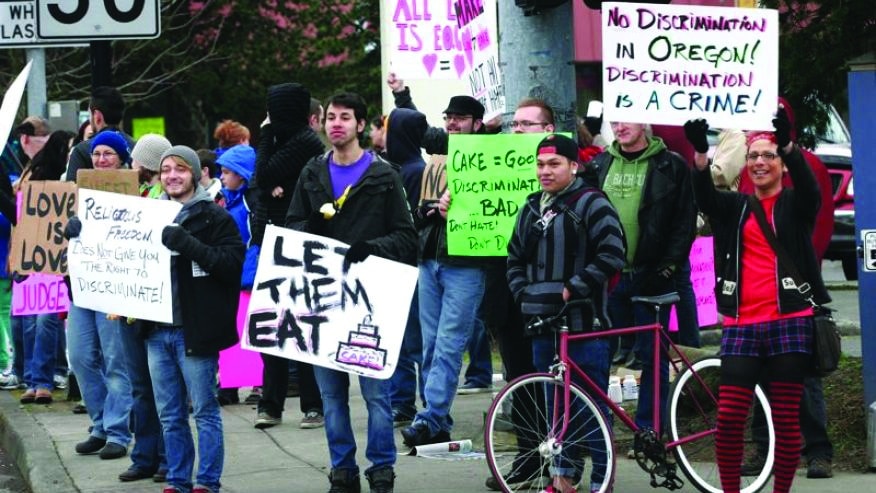Notes on Bekah Brunstetter’s new play, The Cake
By Mark Perry, PlayMakers Dramaturg
“Believe there is good in the world”—So says the sign that greets you as you walk into Dewey’s Bakery on South Stratford Road in Winston-Salem. Well, so says one sign hanging prominently amidst a wall of other competingly heartfelt and homespun sayings beneath shelves of bakeware and decorative kitsch. Just across the street from the original Krispy Kreme (where a chocolate-iced, custard-filled awaits you like a shame grenade), Dewey’s Bakery is the apparent inspiration for “Della’s Sweets,” the set of which sits so enticingly before you in Jan Chambers’ design.

The atmosphere in Dewey’s is full of cheer and good humor and the air holds up the warm, homey smell of mingling baked goods. Young people behind the counter giggle and offer samples of Dewey’s famous pink lemonade cake, with its supercharged bite of punchy sweet. We exchange smiles, ooh and aah over all the possible flavors. There is no thought of impending war, no political debate here. Even the culture wars, in which North Carolina plays so prominently these days, seem a distant concern. In this place, it is not hard at all to believe there is good in the world.
What if the contending peoples of the world would just sit down over some cake and talk through their troubles? Such is the benign vision of Della, our play’s heroine and the owner of Della’s Sweets. Cake is not just a confection. Cake is common ground, a meeting place, as well as a daily meditation. From the practice of baking, Della intuits patterns and spins philosophy—conservative ideas akin to those of her Church and her upbringing. She believes in scrupulous attention to “following the directions.” And yet, like many Southerners, she also believes in the high virtue of sweetness and its capacity for solving, or at least avoiding, problems.
Into Della’s shop comes Macy, hailing from Brooklyn—now a laugh-inducing byword for liberal thinking, despite its own diversity. For Macy, the high virtues seem to be forthrightness and smarts. She manifests a scrupulous attention to a different gospel, a gospel of liberation, identity and jargon. The script describes her voice as being “like a newsfeed, quick and constantly searching for something else.”
For Macy, all things are political. For Della, everything can be brought down to the personal. How can these two find common ground? Della can’t follow half of what Macy says and can’t agree with the other half, but when she tries to slow Macy down with a bite of cake, Macy is repulsed: she is averse to gluten and sugar is poison.
When pressed, Della digs deep and testifies, before Macy’s doubting gaze: “There’s still a whole lotta goodness in the world.”
Well, that might be the end of it in an everyday interaction. Macy could turn around and walk out and Della could go on icing her cake, but playwright Bekah Brunstetter is interested in deepening this dialogue.
“I think those conversations go quicker than they should,” she said in an interview with the LA Times. “People are making assumptions and judgments and just getting angry and storming out. It’s rare that people are forced to be together and listen to each other.”
Into the space of these non-intersecting monologues walks Jen, who connects these worlds both in her relationships and in her being. And with her comes a request and a need that no amount of sweetness or euphemism can evade. Jen needs a cake because she’s getting married: to a woman.
Jen is in many ways a projection of the playwright into this topical, but basically fictional set-up. Bekah Brunstetter is a native of Winston-Salem and a graduate of UNC-Chapel Hill (’04), where she majored in Dramatic Art. (Represent!) She identifies as straight, but she nevertheless lives the cosmopolitan life of a successful writer for TV and Stage on the liberal West Coast. This is quite a shift from her upbringing in a conservative, religious family. In fact, her father, Peter Brunstetter, is a former state senator, who sponsored Amendment 1, which prohibited same-sex marriage in North Carolina. As you will recall, that Amendment passed in 2012 but was declared unconstitutional in federal court in 2014.

Same-sex marriage is now the law of the land. Public support for it is at an all-time high—64%, according to a recent Gallup poll. This includes a majority of Americans who identify as Protestant.
Della is not ready to jump on that bandwagon. She’s no Westboro Baptist, but there are directions to be followed. Time-proven prescriptions for how to live. And yet… this is Jen. Jenny, whom she loves.
And that, speaking dramaturgically, is how you join the political and the personal.
Conservative protests of same-sex marriage have garnered a lot of attention and a lot of litigation in recent years—whether legislators in North Carolina, a cake-baking couple in Oregon, or a county clerk in Kentucky. Viewed from their own quarter, their plights may feel tragic and self-sacrificial, as they fall one by one before the juggernaut of marriage equality.
From the mainstream, however, and especially in the eyes of millennials, they seem completely out of touch with the time. These subscribe to the Lin-Manuel Miranda credo: “Love is love is love is love is love.” And sometimes what is not love or full-out unconditional support is labeled hate. This is an area where The Cake seeks to soften the rhetoric.
Hate is not something we find in the ingredient list of our conservative protagonist. Brunstetter has fashioned Della such that her crisis is a negotiation of powerful loves. Her love for Jen is set up against her love for Jesus. And it’s not something she can compartmentalize the way her husband Tim does.
As director and Center for Dramatic Art veteran Jeff Meanza astutely noted: Della and Tim constitute two halves of a metaphorical whole. Whereas Della’s job as baker concerns what goes into the human being, Tim’s job as plumber concerns that which goes out. They are Middle America’s Eve and Adam, or perhaps Lot and Wife are a better comparison. For, as Lot’s Wife turned to look back—Euridyce-like—to the ways of Sodom, and so turned into a pillar of salt, here Della is reconsidering her values in the face of what Tim affirms as biblical abomination. Tim is not a thinker; with his work all backed up, he has little time to keep tabs on the cultural warfront. He finds his equilibrium in the eternal good news and in tradition.
Della is having a hard time keeping her equilibrium. Her conscience is beginning to collide with her fantasy-life, and it’s coming out in bursts of shame and self-loathing. The voice of this internal judge of hers, as might be the case with much of America, is best delivered in a British accent. It’s the voice of George, the handsome, truth-speaking personality on a Reality TV baking show on which Della is scheduled to be a contestant. (George is a thinly-veiled stand-in for Paul Hollywood, the silver fox judge on “The Great British Bake Off”—he’s the PBS version of Simon Cowell.)
This booming male voice is a signal of a strongly patriarchal internalized attachment for Della. One might say she has daddy issues with God. This is psychologically understandable, but this character trait may undercut the seriousness with which we approach her ethical dilemma—a dilemma similar to ones faced by followers of orthodox interpretations of religion throughout the world:
If a Christian bakes a cake for a gay couple, she might just consider it another sale. Or she might see it as an act of condoning, and thereby contributing to the normalization of same-sex marriage in society. If she attends a gay wedding, is she not bound by the ancient rites of marriage not only to wish that couple well, but also to contribute to, and indeed pray for, the success and flourishing of that union? How could she do this if she sees a homosexual union as essentially sinful? Then again, does she?

In the liberal imagination, it is sometimes difficult to parse a legitimate moral consideration from the toxic paternalistic enforcement that has for centuries asserted it. This can lead to dismissing serious ethical questions as they are seen from the conservative point of view. Such emotional dismissals are hardly limited to the liberal side.
A sign of the times is a diminishing ability to appreciate the good faith intentions of those on the “other side.” This is compounded when we avoid direct conversations with people of different points of view. Making moral pronouncements is easier in the absence of opposition. Yelling at the TV or preaching to a choir of like-minded friends begins to feel like waging battle for one’s Cause. Offense and exasperation becomes a habitual stance, rather than an occasional resort in times of extremity.
Can we step back and “believe there is good in world” and in the hearts and minds of our neighbors and fellow citizens of all stripes?
The conservative perspective is one that the contemporary American theatre seldom treats with equanimity. More often, it is shown as antithetical, if not diabolical, in its relation to the hero. Brunstetter wants to buck this trend.
In March, she told the Daily Tar Heel, “[M]y goal has always been to humanize conservative values. Like a lot of people in North Carolina do, I come from a very loving, wonderful, very conservative family, so it’s been my life journey to see what’s human about that.”
See The Cake on stage at PlayMakers Repertory Company, September 13 through October 1. For tickets, click here or call 919.962.7529.